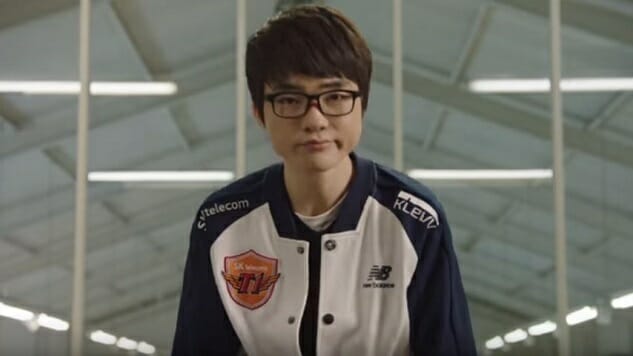How Hating Faker Made Me Love League of Legends
Images from LoL Esports YouTube channel Games Features League of Legends
You can’t swing a mouse in e-sports journalism these days without hitting a fawning profile of Lee “Faker” Sang-hyeok. “The biggest difference between Faker and LeBron? LeBron didn’t win a title in his first three seasons,” gushes ESPN’s Tyler Erzberger. Faker, who on October 29th won his third League of Legends world championship in four years, is assigned such breathless sobriquets as “The Unkillable Demon King” and “God.” Slingshot ran a whole nauseatingly wistful article describing his behavior at a press conference where they couldn’t land an interview: “As I snapped a few pictures of my own, I thought of what it must have been like for Sang-hyeok … Only the bigger publications got their hands on him … He understood how to behave in front of the media: professional, clear-spoken, and confident.”
I can’t stand Faker, and I think the bubble of obsequious hype that surrounds him is largely to blame. Faker himself seems like a nice enough guy, albeit confident to the point of arrogance (“I’m not really affected by long series, but I did get a little hungry after Game 4, so I had a chocolate bar and was all good”). But plenty of my favorite e-sports players are confident. There’s something else about Faker that irritates me, even if I can’t put my finger on exactly what it is.
I haven’t historically been a League of Legends fan. In the MOBA wars, I tend to side with Dota 2. And since Dota 2 doesn’t have anyone nearly as dominant as Faker, my distaste for him might simply be jealousy that the putative “Michael Jordan of e-sports” happens to play League. But I also think it’s natural for every superstar, regardless of sport, to engender a cadre of anti-fans, people who find the wheedling hero-worship skin-crawly and irritating. “He’s not that good,” we snivel. “Sports journalists just exaggerate his greatness, because they know that superstars attract attention, and at the end of the day, what is modern sports journalism if not slack-jawed promotional material,” the more verbose and irate among us continue.
But so there was nothing I wanted more on the night of the 2016 World Championship Grand Finals than to see Faker lose, preferably in the most embarrassing way possible. The first game was promising—Samsung Galaxy (SSG) held off Faker’s SK Telecom T1 (SKT) for 54 minutes before collapsing. But in game two, SSG got certifiably disemboweled. And when SKT started off hot in game three, it looked like the five-year curse of lopsided Grand Finals was likely to continue. Concessions in the venue began to close down after SKT won their lanes. At home, I very nearly turned my stream off.
Then SKT fucked up. Consumed by hubris, they attempted to take Baron with only four of their five champions. SSG swooped in and murdered them all. The Staples Center crowd went positively bonkers. So did the announcers, though they’d shown a proclivity to go bonkers at just about anything. And as I watched SSG close out game three, I became aware of a strange sensation: I was enjoying League of Legends!
That’s significant because MOBAs are often criticized for being no fun to watch if you’re not a player. Spells and projectiles fly willy-nilly all over the screen, the announcers use a lot of unfamiliar lingo (“They popped his Guardian Angel!”), and games often end abruptly, in a single multicolored explosion, after long periods of nothing happening at all. But for me, a complete noob watching his first Worlds grand finals, none of that mattered. I certainly didn’t understand the intricacies of the on-screen action, but I couldn’t stop watching. I wanted Samsung Galaxy to win so bad.
This may be how e-sports prove themselves equal to traditional sports. Competitions of all kinds are only as fascinating as the stories they create. I rarely watch basketball, but you bet I tuned in for game seven of the 2016 NBA Finals, when LeBron James carried the Cleveland Cavaliers to ultimate victory over the Golden State Warriors, who at one point led the series 3-1. We love to see underdogs prevail, because in our hearts we are all underdogs. But I think we also love to see titans crumble, if only to wipe the cocky grins off the faces of their insufferable fans. (Good teams attract insufferable fans the way mud pits attract warthogs.) So if many fans celebrated Cleveland’s glorious victory, there were plenty for whom the true joy was Golden State’s implosion. I’ll admit to feeling an ecstatic jolt of schadenfreude when Steph Curry missed his final Deep Three. And as Samsung Galaxy took game four by picking off The Unkillable Demon King himself, that same electricity coursed through me. I girded myself for the fifth and final game, hoping beyond hope that SSG would pull off a miracle.
They didn’t, of course. SKT won the deciding game with guillotine ease. But I watched until the Nexus fell. I watched, salty as the Dead Sea but unequivocally riveted, as the players burst from their clamshell booth, rejoiced, and hoisted the Summoner’s Cup aloft. My thirst for Faker’s downfall had only intensified. But rooting against him had changed something within me. One day, he would faceplant in spectacular fashion, and I knew I’d be there to see it. Faker had gained a hater, but League of Legends had gained a fan.
Justin Groot is a freelance journalist and aspiring author living in Atlanta, Georgia. He’s a big fan of George Saunders, dogs named Biscuit, and the Oxford comma. Follow him on Twitter @aStrayClay.